Wilderness Therapeutic Approaches and Interventions
The Level 2 Award
-
Training exclusively for school staff, with your own identified children

-
Designed only for schools, to be impactful and accessible, and as a sustainable investment, run by the school ongoing.
-
Impact Assessment training and reporting built in.
Learning Units for the Level 2 Award
This LEVEL 2 AWARD is comprehensive in its content and experiential in its approach.
In terms of:
- Outdoor Skills
- Appropriate Activities
- Structure of Therapeutic Interventions
- Therapeutic Group Management Outdoors
- Therapeutic Content and its Application
- Impact Assessment and Reporting
…this is a high level of training, run with your own children. This is not simply “outdoor activity which implicitly improves wellbeing”. All school-staff Learners will receive training to typically achieve a very high working level and ability in order to confidently and competently, safely and successfully run the Wilderness Therapeutic Intervention selected, ongoing and independently with school.
What are the Learning Units?
You will be required to meet competencies within 4 separate Learning Units, which will be assessed as far as possible “on the job” in sessions, but crucially also in post-session debriefings and self-study of Therapeutic White Papers from eQe. You will also be required to create an Impact Assessment Report and attend an off-site scheduled Skills and Assessment Day with other Learners.
UNIT 1: Outdoor Skills 1 – Basic Bushcraft
UNIT 2: Outdoor Skills 2 – Wilderness Therapeutic Group Management
UNIT 3: Therapeutic Approaches and Application
UNIT 4: eQe 4-Dimensions Impact Assessment Approach
This LEVEL 2 AWARD is considered a high level of training, being not just about outdoor activity, or pedagogy with young children; nor is it simply and implicitly “wellbeing” based; nor is it happening without any actual children during training:
- This is explicitly and intentionally Therapeutic Intervention programme training
- It is highly targeted at identified small groups of children within the 4 to 24 years age / ability range
- You are working to best therapeutic practice
- You are learning with real children – your children – throughout the programme
Inevitably within proper therapeutic work, one size does NOT fit all, which allows you to choose an appropriate and impactful programme for a specific age / ability group to work with, matching the correct Intervention Training to meet your strategy within your school. So we gauge this as a LEVEL 2 Award qualification, in therapeutic terms, only because of this necessarily being a highly targeted approach for specific developmental age or ability groups, and it should not be compared to other outdoor-based Level 2 training – We have set the bar very high. Much of the content in our Level 2 Award, that might be regarded as comparable, is at least as high as that in other kinds of outdoor-based Level 3 training.
Your choice of Level 2 Training Interventions
For all children, in all schools – We work with children with a broad range of issues, ranging from mainstream children with everyday basic social and emotional issues, low confidence and low self-esteem, through to children with deeper issues, behavioural issues, and additional identified and diagnosed issues like ASD, ADHD, MLD / SLD. There are a number of targeted interventions to choose from, because they are all designed and constructed to be impactful at different age / ability levels and developmental levels.

What do these different Interventions look like?
It is important to recognise this is not simply “activities to do in the woods” which might then implicitly benefit a child’s immediate sense of wellbeing in the very short term – These are explicitly therapeutic Small-Group Interventions, structured and run to best therapeutic practice, with defined outcomes and objectives for each child, for a long-lasting impact.
eQe will consult with you regarding your children’s profiles, needs and issues. We work together to select the most appropriate intervention to meet your immediate needs, or strategically down the line.
Wild Crew
- LEVEL 2 AWARD: Wilderness Therapeutic Approaches – NCFE Accredited Qualification
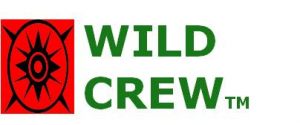
- Explicitly Therapeutic Small-Group Intervention
- Sustainable (Capacity Building – We train you to run it)
- Measurable Impact – Includes eQe 4-Dimensions Impact Assessment Approach
- For small groups from Yr 5 ability up to Young Adult (~24yrs)
WILD CREW™ Is about “Who am I, now? How did I get here? What do others think about me? What do I think about myself? And if I keep going as I am, where will I go? Do I want to go a different way? What do I need to change or deal with, if I want to go a different way in life?”

WILD CREW™ is implemented in consultation with you to explore specific themed issues, needs and objectives for high functioning identified individuals and small groups – e.g. personal, social and emotional issues, confidence and wellbeing, often compounded by behaviours, SEBD/SEMH, ADHD, Autism/ASD, and other identified needs.
It exploits a range of recognised and established therapeutic approaches, alongside Wilderness Therapy / Rites of Passage techniques and Mentoring. These are uniquely integrated, using eQe’s long professional expertise in therapy and therapeutic approaches with children and young people.
Using specific eQeOUTDOORS’ activities, expertly designed to run alongside professionally structured and guided discussion and reflection activities, integrated with low-level therapeutic approaches, it enables the group members to be: more Self Aware; more Emotionally Intelligent and therefore more aligned in their behaviour; hence able to develop in the Six Pillars of True Self-Esteem; and to improve their lives now and also their future expectation as they progress to become adults.
WILD CREW™ provides you with a proven and effective outdoor therapeutic intervention, which is measurable in its impact, that can subsequently be delivered and adapted competently, confidently, and safely by eQe-trained and externally certified and qualified members of your school staff.
Make The Leap
- LEVEL 2 AWARD: Wilderness Therapeutic Approaches – NCFE Accredited Qualification

- Explicitly Therapeutic Small-Group Outdoor Intervention
- Sustainable (Capacity Building – We train you to run it)
- Measurable Impact – Includes eQe 4-Dimensions Impact Assessment Approach
- Small groups from Yr 6 up to Young Adult (~24 years)
The ultimate outcomes are similar to WILD CREW, but the route to get there is very different, focusing on a three-stage “Dealing With Change” process.
This can be run stand-alone in a school, wherever change and transition are a factor. It can also be used by collaborating primary/secondary, bridging Year 6-7.
DEALING WITH CHANGE AND TRANSITION – eQe MAKE THE LEAP™ has three phases:
- It first exposes participants to forced change, and builds Awareness of Change all around us, normalising change and beginning to normalise our response to it.
- It then moves on to develop the participants into Masters of Change, by seeing that we can develop strategies to deal with changes forced upon us.
- Ultimately the participants then work to become the Designers of Change in their own lives – Taking control and determining their own direction.
This Intervention exposes participants to the value of self, of other people, and of being a productive part of a tribe, ultimately deciding on our place in the world. It builds respect for self, others, and our world, and resets how we relate to ourselves and the people around us. Each participant makes firm intention statements around their future and making changes to take control of their direction in life.
My Tribe
- LEVEL 2 AWARD: Wilderness Therapeutic Approaches – NCFE Accredited Qualification
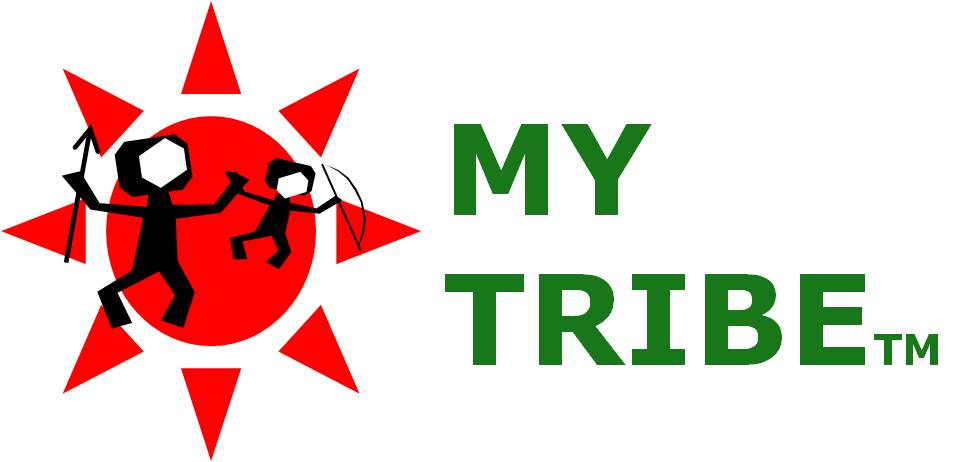
- Explicitly Therapeutic / Developmental Small-Group Intervention
- Sustainable (Capacity Building – We train you to run it)
- Measurable Impact – Includes eQe 4-Dimensions Impact Assessment Approach
- Small Mixed Age SEN Group – A range of ages are incorporated
“Who am I? How do I relate to others? What is my role? What is good about me?”
MIXED YEAR GROUPS – SEN CHILDREN – The primary priority here is straightforward, to ensure everyone experiences belonging, inclusion, and develops a valued role to play.
This intervention is a mixed small-group programme for targeted and identified SEN children who may be currently struggling socially and emotionally, or for those who may be presenting specific identified issues – sometimes including SEN LAC/C4C children, or Post-LAC children, who may be lacking a sense of belonging, and also often incorporating SEBD, ADHD, Autism, SLD, or other special needs and issues.
MY TRIBE™ consciously and directively explores and builds social skills and responsibilities in the context of this Tribal bubble. It is specifically designed to target mixed age groups and mixed abilities and needs, for more social structural and engagement aims, which are perhaps less explicit in our higher-level programmes Wild Things™, Wild Crew™ and Wild Tribe™.
Focusing on the lower elements of Maslow’s Hierarchy of Needs and Porter’s Tree of Needs, MY TRIBE™ spotlights “building-block” elements such as “I am safe; I am cared for; My needs are being met; I am safe and accepted; I belong”. It also highlights helping others to feel like this too. In some the result may be improved Emotional Intelligence and subsequent Self Esteem.
Different to Wild Things™? Whereas Wild Things™ is about personal safety, security and self-confidence, and working at an unconscious level in young children, MY TRIBE™ is more directive and conscious in terms of inclusivity and belonging. It examines self, intrapersonal issues, responsibilities to others – Interpersonal issues like respect for self, and for others.
Different to Wild Crew™? Whereas Wild Crew™ is a high-level programme, about preparation of participants heading towards their future – exploring personal issues as these young people head towards adulthood – MY TRIBE™ is about simply where we are now, developing basic awareness of others and self-knowledge, in the context of the “My Tribe experience”.
Different to Wild Tribe™? Wild Tribe™ is a high-level programme, about Self Actualisation – examining “Who am I right now, and how can I be my best self?”, while developing and transferring firm intentions about oneself into other areas of one’s life. However, MY TRIBE™ focuses on the simple experience itself – of becoming a valued part of the tribe, irrespective of age, ability, or issues. It is about teamwork, cooperating, empathy, social skills, belonging, and having a place. Diversity, helping others, identifying what is good in oneself and others, identifying who I am, and relating to others are the keys here.
Wild Things
- LEVEL 2 AWARD: Wilderness Therapeutic Approaches – NCFE Accredited Qualification

- Explicitly Developmental Small-Group Intervention
- Sustainable (Capacity Building-Training you to run it)
- Measurable Impact – Includes eQe 4-Dimensions Impact Assessment Approach
KEY STAGE 1 – This capacity building early intervention for up to year 2 / ability is two-fold: 1. A small group intervention for targeted, identified children who may be struggling socially and emotionally, and 2. For half-class groups as a fun and developmental booster for all. WILD THINGS™ is equally effective as an explicit therapeutic intervention for identified children; and as a preventative programme / development booster for all children.
This is a FUN programme. It taps into Wilderness Therapy, Developmental and Creative Approaches. Uniquely combined with eQe’s long expertise in therapeutic interventions, we explore 4 specific key developmental Behaviour Patterns or “Schemas” – these Schemas are identified by eQe’s professional therapists as being closely connected with social, emotional and behavioural development. Participants experience safety, containment and belonging. They will learn to connect positively with others and will develop a sense of appropriate boundaries. From these they will experience freedom to explore their environment, their peers, and themselves, and have their senses awakened using the rich eQeOUTDOORS’ WILD THINGS pedagogy.
Specific physical and mental developmental processes will be exercised strongly in this programme.
WILD THINGS™ provides you with an effective outdoor therapeutic intervention and development booster programme, designed for this young age / ability level, that can subsequently be delivered and adapted competently, confidently, and safely by eQe-trained and externally certified and qualified members of your staff.
Wild Tribe
- LEVEL 2 AWARD: Wilderness Therapeutic Approaches – NCFE Accredited Qualification
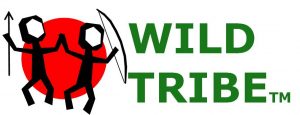
- Explicitly Therapeutic Small-Group Intervention
- Sustainable (Capacity Building – We train you to run it)
- Measurable Impact – Includes eQe 4-Dimensions Impact Assessment Approach
- For small groups around Year 3 and 4 / ability level
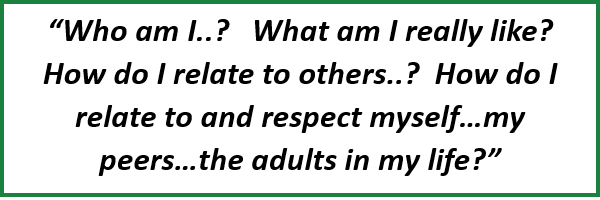
Wild Tribe™ consciously and directively explores and transfers social skills and responsibilities into all areas of children’s lives. YEARS 3 and 4 / social, emotional or developmental ability – This outdoor, capacity building, therapeutic and developmental intervention is a small group programme for identified children who may be currently struggling socially and emotionally; or for those who may be presenting specific identified issues – typically SEBD, ADHD, Autism, or other special needs and issues.
Specifically designed to target the tricky middle-ground / ability of Years 3 and 4 – that are too old for Wild Things™ and too young for Wild Crew™. It has been developed specifically in response to schools identifying the need for an intervention for Yr 3/4.
Different to Wild Things™? Whereas Wild Things™ is about personal safety, security and self-confidence, and working at an unconscious level in young children, WILD TRIBE™ is more directive and conscious. It examines self – who am I? – intrapersonal issues, and responsibilities to others – Interpersonal issues like respect for self, for others, and for the world beyond our own skin.
Different to Wild Crew™? Whereas Wild Crew™ is about preparation of participants heading towards their future, exploring personal issues as these young people head towards adulthood, WILD TRIBE™ is about where we are right now, developing better self-knowledge, so that changes and firm intentions can be made, to transfer experiences and learning in the wild back into everyday parts of their lives – behaviours at home, and at school.
Wild Me
MULTIPLE LEARNING DIFFICULTIES LOW-LEVEL DEVELOPMENTAL PROGRAMME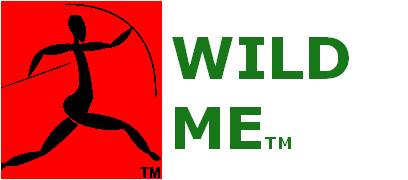
- LEVEL 2 AWARD: Wilderness Therapeutic Approaches – NCFE Accredited Qualification
- Explicitly Developmental / Therapeutic Small-Group Intervention
- Sustainable (Capacity Building – We train you to run it)
- Measurable Impact – Includes eQe 4-Dimensions Impact Assessment Approach
- Small Mixed Groups up to Young Adult (~24 Years)
MIXED YEAR GROUPS / SEN / MLD – Like MY TRIBE™, the primary priority here is to ensure everyone experiences belonging and inclusion. This outdoor, capacity building, developmental intervention is a mixed low-level small group programme for e.g. MLD children or young adults.
This programme runs on the principles of three Therapeutic Developmental Streams:
Like any other individuals, these children also have to cope with normal life and all of the social and emotional challenges that brings. They may benefit from boosting things socially and emotionally, and like all participants may also be presenting other specific identified issues. They may also be coping with being a cared for (LAC / C4) child, and also SEBD, ADHD, ASD, or other physical special needs and issues.
Whatever level these children are operating at, these Developmental Stages, or streams of developmental behaviours, are distinct and necessary for the ongoing development of healthy, rounded individuals. They work “in order”, and each affects the success of the next. If they are missing, or poorly developed, there are consequences down the line.
 SELF CONCEPT – “I AM JUST BEING” CONTEXT – HERE AND NOW
SELF CONCEPT – “I AM JUST BEING” CONTEXT – HERE AND NOW
ACTIVITY FOCUS: “I AM SAFE AND SPECIAL. MY NEEDS ARE BEING MET.”
 SELF CONCEPT – “I AM DOING” CONTEXT – HERE AND NOW… and effect on the future
SELF CONCEPT – “I AM DOING” CONTEXT – HERE AND NOW… and effect on the future
ACTIVITY FOCUS: “I AM EXPLORING SAFELY. I AM LEARNING ABOUT CAUSE AND EFFECT.”
 SELF CONCEPT – “I AM THINKING” CONTEXT – HERE, THERE, NOW, THEN! IMAGINATION AND REALITY
SELF CONCEPT – “I AM THINKING” CONTEXT – HERE, THERE, NOW, THEN! IMAGINATION AND REALITY
ACTIVITY FOCUS: “I EXPRESS MYSELF. I EXHIBIT SELF CONTROL. I UNDERSTAND CONCEPTS. I HAVE EMOTIONAL UNDERSTANDING.”
The Structure – How it runs
We come to you. We work together to find a suitable wild / woodland site to take the children to, that you may then be able to use ongoing.
TWO Identified school staff are trained experientially – on the job – with a group of your own children, in school time. We work with you to decide on the most suitable Intervention to train to run, in line with your children’s immediate needs or future strategic requirements of the school.
The training and Intervention take place in a school term, usually weekly for 8 contact sessions each a half-day long.
eQe’s job is twofold – To take a group of children through an intervention; and to train your two identified Learner Staff to run the intervention thereafter.
How is the training structured?
- Planning and Profiling: We have a planning meeting together to help you iron out logistics (site, transport, calendar etc). This meeting is also the beginning of the Learner’s training. In the meeting we start to look at how to profile and construct therapeutic small-groups – Therapeutic best practice limits this to maximum of 8 participants per group. We use tools from our eQe 4-Dimensions Impact Assessment Approach to “measure” the children in the long-list, and from that select a shortlist that we all believe might achieve your objectives for that group or individuals. Objectives for the group and individuals are set. We introduce the Learner’s to the Impact Assessment techniques we will be using.
- Risk Assessments: eQe prepare professional Site Risk Assessment; Weather and Welfare Assessment; Activity Risk Assessments. These are given to you to use as templates ongoing
- Contact Sessions: 8 contact sessions with the children, scheduled through the school term, with the Learners getting first-hand experience of the children and working in the selected Intervention. You are given all standard Weekly Session Plans for your selected Intervention.
- Debriefings: After every contact session, Learners must then debrief fully with the eQe consultant. This is where a lot of learning and reflection goes on, making use of the eQe Observation Toolkit, and also evolving forward-planning for future sessions. It is also where you are in receipt of our Training White-Papers, and learn about the underlying therapeutic premise and its application within the context of an explicitly therapeutic intervention programme.
- Impact Assessment and Report: Evidences and observations, reflecting the content of the training, eQe Observation Toolkit, eQe 4-D Impact Assessment Approach, and White-Papers, is pulled together by the Learners into a final Impact Assessment Report, and presented to school’s Senior Leadership. This report:
- Reflects the Impact of the intervention on the individual children in the group, and on the objectives set at the start of the intervention for each child
- Justifies the resources allocated to the training and to trained staff running the intervention ongoing in your school
- Contributes to other reports e.g.: Pupil Premium spend; OFSTED reports; Mental Health and Wellbeing reports
- Skills and Assessment Day: All Learners should attend a scheduled follow-up Skills and Assessment Day with other Learner’s from other schools, to complete the training
NOTE: In order to complete the LEVEL 2 AWARD in Wilderness Therapeutic Approaches and Interventions, and achieve the Qualification Status, all Learners must:
- Attend 7 out of 8 Contact Sessions
- Attend 7 out of 8 Post-Session Debriefings fully
- Attend a scheduled Skills and Assessment Day
- Create an Impact Assessment Report within a deadline and to a standard, which then may be required by the Awarding Body (NCFE / CACHE) to be Externally Quality Assured.
NOTE: Training to run a specific intervention on the Level 2 Award does not mean you are trained to run the other interventions available. You are also not trained to train others. Our Certificate Level Training, however, equips you with a much broader and deeper scope of learning, enabling you to design and implement your own Wilderness Therapeutic Interventions (Level 3 – The Certificate in Advanced Wilderness Therapeutic Approaches)
Track Record and Impact of our Interventions
eQe people have been training school staff since 1998. Hundreds of school staff have implemented eQe approaches, programmes and had eQe therapeutic training. Using impact assessment data from a range of different schools and widely different profiles of children, our Wilderness Therapeutic Interventions show dramatic changes in children using Standardised Therapeutic Measures over only 8 half-day sessions:
88% of children reduced their Total Difficulties Scores, e.g. in Externalising Behaviours (Conduct and Hyperactivity), and Internalising Behaviours (Emotional Problems and Peer Problems)
95.5% of children improved their Pro-Social Scores

Read more about our Track Record and impact
-
- In 2016 Robin Sheehan (Director, eQeOUTDOORS) was invited to consult for the NHS on the use of community woodlands and NHS greenspaces, focusing on how to measure the impact on wellbeing operating in these spaces. Working alongside the European Centre for Environment and Human Health, the handbook was published – “ROOTS TO WELLBEING- A handbook for evaluating and communicating the wellbeing impact of woodland social enterprises”
- In 2006 our Lead Therapist received the Play Therapy International Award.
THERAPEUTIC APPROACHES…
…eQeOUTDOORS’ explicitly therapeutic programmes are structured and progressive, using recognised and established Therapeutic Approaches, uniquely integrated with other disciplines:
Read more...
In our portfolio of Interventions we use challenging, diverse activities and structured projects and approaches, uniquely integrating:
| Wilderness Therapy | Change and Transition Management |
| Other established Therapeutic Approaches | Self Mastery and Mentoring |
| Rites of Passage | Advanced Bushcraft |
| Backwoods Survival and Hunter Gatherer Skills | Long-term wilderness living skills |
| Environment Mastery | Creativity, Strategy, and Problem Solving |
Character Education and Personal Development
All eQeOUTDOORS programmes are designed to encourage growth of individuals in a number of areas, working alongside eQe’s Therapeutic Imperative of our interventions.
eQeOUTDOORS also have these specific Character Education and Outdoor Skills training programmes, which are not explicitly therapeutic and are not part of the Level 2 Award training:

Read more...
Growth areas we seek to promote in all of our Therapeutic Interventions and non-therapeutic Character Education Programmes:
| Perseverance and Resilience | Respect for Our Community and World |
| Tolerance and Respect for Others | Integrity, Trust, Openness |
| Bullying Response and Behaviour | True Self-esteem and Dignity |
| Confidence and “Can Do” Attitude | A Desire to Explore and to Learn |
| Self-Motivation; Self-Regulation; Self-Awareness | Tenacity – Don’t Give Up |
| Empathy and Social Skills | Concentration |
| Team skills, Practical skills |
“CALGACH” AND CHARACTER EDUCATION – Traits that we expect to work with and encourage through targeted use of activities: 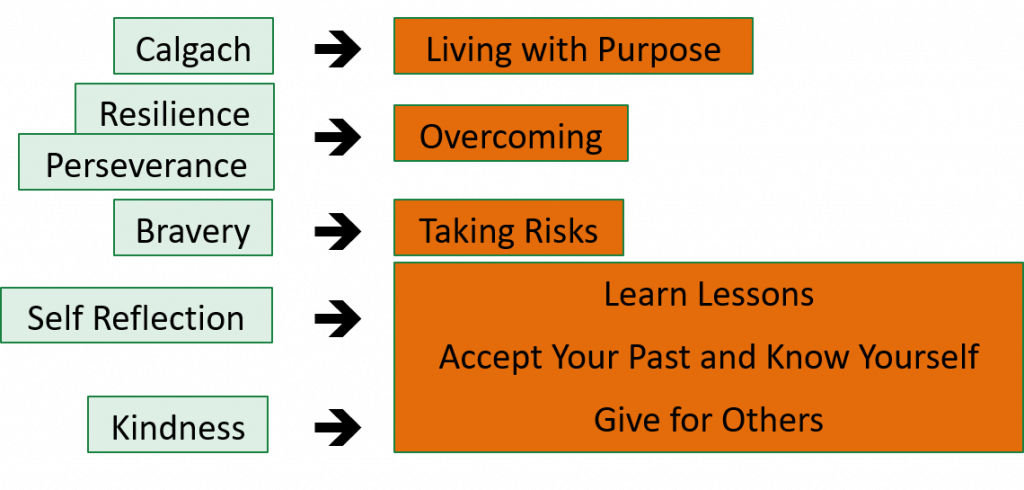

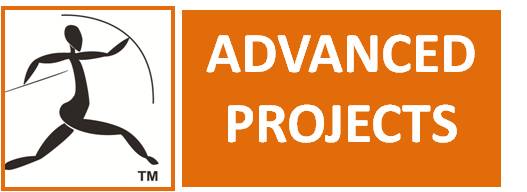 These are some projects we can use with participants who are woodland-ready, to engage them in a challenging, longer term (6-12 session) objective. The projects involve learning new skills in some depth, and gaining knowledge and experience they do not already have.
These are some projects we can use with participants who are woodland-ready, to engage them in a challenging, longer term (6-12 session) objective. The projects involve learning new skills in some depth, and gaining knowledge and experience they do not already have.
For boys, girls and mixed groups
The projects are explicitly team based, but balanced with significant personal challenge and a need to engage personally as part of a team, with your own part to play. Hard-won achievement and subsequent self-esteem and confidence are the goals for everyone here, and an increased ability to relate better to self, peers and adults. I BUILT A HOUSE – I MASTERED FIRE – I MADE STUFF – I AM A HUNTER – I AM A NAVIGATOR
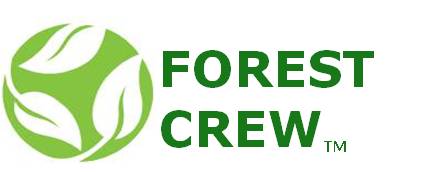 Primary/Secondary All Ages– This capacity building training programme introduces eQeOUTDOORS mainstream outdoor approaches and structured methodology, more structured and progressive in outdoor skills than most forest schools programmes (see below). It provides an effective programme of outdoor learning and activities that can subsequently be delivered and developed competently, confidently, and safely by an eQe-trained and certified member of your school staff.
Primary/Secondary All Ages– This capacity building training programme introduces eQeOUTDOORS mainstream outdoor approaches and structured methodology, more structured and progressive in outdoor skills than most forest schools programmes (see below). It provides an effective programme of outdoor learning and activities that can subsequently be delivered and developed competently, confidently, and safely by an eQe-trained and certified member of your school staff.
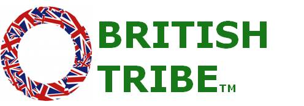 BRITISH TRIBE is an outdoor programme helping schools to meet their responsibilities around delivering British Values to students in schools.
BRITISH TRIBE is an outdoor programme helping schools to meet their responsibilities around delivering British Values to students in schools.
Over a period of 8 sessions, the children are tasked with creating a new tribe, from scratch, which is built based on the principles of British Values.
Can they put all the pillars of British Values into working practice to make a stable, functioning tribe, alongside learning outdoor skills that our ancestors had learnt and used to make a tribal community work?
Can they put all the pillars of British Values into working practice to make a stable, functioning tribe, alongside learning outdoor skills that our ancestors had learnt and used to make a tribal community work?
| BRITISH TRIBE™ |
| DEMOCRACY |
| RULE OF LAW |
| INDIVIDUAL LIBERTY |
| MUTUAL RESPECT |
| TOLERANCE OF THOSE WITH DIFFERENT FAITHS, BELIEFS, OR NONE |
| COMPASSSION AND KINDNESS |
| Other Tribal Principles |
Cost
£2300 + VAT (10% discount on all eQe and eQeOUTDOORS training for existing eQe clients ongoing)
This pays for:
- “We come to you” Training
- Whole-Staff Twilight seminar on Wilderness Therapy in Schools
- Two school staff to be trained to run the selected Wilderness Therapeutic Intervention in one school term
- A group of children to be taken through the selected Wilderness Therapeutic Intervention
- Structure and content of the specific Intervention you have trained in
- Weekly Session Planning
- Professional Site Risk Assessment and core template for future use and adaptation by you
- Weather and Welfare Assessment
- Activity Risk Assessments
- eQe Therapeutic Training White Papers and other learning materials, including eQe’s 4-Dimensions Impact Assessment Approach
- Observation toolkit materials
- Registration of the school staff Learners with the awarding body and external quality auditors
- Qualification Certification from the external awarding body (NCFE / CACHE) on successful in the completion of the training (LEVEL 2 AWARD in Wilderness Therapeutic Approaches and Interventions)
